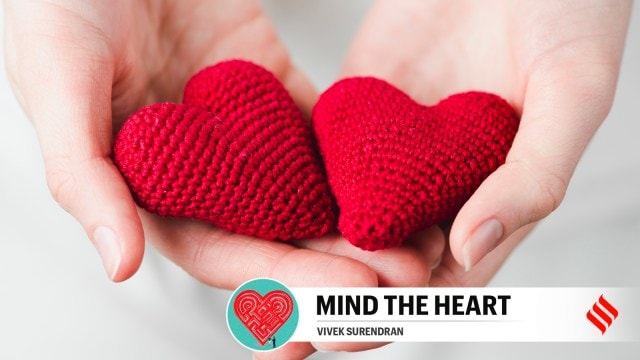📣 For more lifestyle news, click here to join our WhatsApp Channel and also follow us on Instagram
Falling fast, loving deep: What it really means to find ‘the one’ instantly
Sometimes love takes years. Sometimes, it takes one evening. What matters is not how fast you fall, but how true it feels.
 How soon is too soon to fall in love? (Source: Freepik)
How soon is too soon to fall in love? (Source: Freepik)One meeting –– not even a date, it was just a random plan to catch up over drinks –– is all it took for my partner and me to know that we were going to spend the rest of our lives together. I have always believed in the concept of love at first sight. It was that for me. For her, it started as an infatuation during the day, but by the time I dropped her home, she was sure too. That day alone could be a fantastic romantic movie I might write someday.
Within two minutes of starting my drive back to Delhi from Gurgaon, I called my best friend and told him, “I’m marrying her.” I was that sure. I called my parents next and said the same thing. Sometimes, all it takes is one meeting –– a few hours spent together. A month and a half later, an astrologer told us that our horoscopes showed we had been partners across lifetimes. I am an atheist, but in moments like that, I don’t mind believing.
I share this story because it leads to a question I’ve heard people debate endlessly: how soon is too soon in a relationship?
The knowing that only two people can have
There isn’t a formula for certainty. You can’t measure it in days or dates. After years of watching friends stumble into love, fall out of it, and find it again, and having gone through it myself, I’ve realised something simple: only the two people inside the relationship know when it’s real. Everyone else is guessing –– even judging –– from the sidelines.
Sometimes, it takes years — shared mornings, late-night fights, awkward holidays, and learning how to fold each other’s habits into your own. Sometimes, it takes a single evening when time collapses, and you feel as though you’ve known the person long before you met them.
In psychology, there’s a concept called liminal knowing — the idea that our intuition often recognises truth before our rational brain catches up. When you meet someone who feels instantly familiar, it isn’t magic; it’s your subconscious picking up a lifetime of cues, telling you that this is safe ground. Philosopher Martin Buber called this the I-Thou connection — a sacred meeting where two people recognise the other not as an object, but as a soul. That kind of knowing doesn’t depend on time. It just happens.
It’s easy for outsiders to call it impulsive or reckless. But love has its own logic. What seems hasty to others might, for you, feel like coming home.
What peace sounds like
I have heard a lot of life coaches and gurus say there is no “right” person. I disagree, vehemently. When you meet the “right” person, the body usually knows before the mind does. The thrill, the quickening pulse — that’s attraction, yes, but what really matters is what follows: peace. That grounded sense that you can finally exhale, be yourself.
We talk a lot about butterflies, but peace is rarer. It’s what tells you, you’re safe here. You can be messy, tired, unfiltered — and you’re still understood. That’s the real test. When you don’t feel the need to perform, when you can tell them about your worst day and they don’t rush to fix it — just stay — that’s love in its most human form.
Psychologists call this secure attachment: the feeling that you can depend on someone emotionally without losing your independence. The brain produces oxytocin, the bonding hormone, which literally quietens the amygdala — the part that controls fear and vigilance. That’s why genuine love doesn’t feel like intensity; it feels like calm.
Philosophically, it’s the meeting point between eros and agape — passion grounded in compassion. Love that burns gently, not wildly. And while shared backgrounds or values help, they’re not everything. What matters more is whether you can speak the same emotional language — how you listen, argue, forgive. Relationships don’t survive on chemistry alone; they last because two people decide to keep showing up, even when it’s inconvenient. And only the “right” person would do it.
 It’s easy for outsiders to call it impulsive or reckless. But love has its own logic. (Source: Freepik)
It’s easy for outsiders to call it impulsive or reckless. But love has its own logic. (Source: Freepik)
Recognition, not discovery
The ancient Greeks had a word for this moment: anagnorisis — not the act of falling in love, but of recognising it. That’s what that Gurgaon night was for me. It didn’t feel like falling; it felt like remembering –– like finding a door I hadn’t realised was mine to take.
Philosophers sometimes speak of resonance theory — the idea that some people vibrate at the same frequency of being. When we meet them, there’s an inexplicable sense of recognition, as though something inside us aligns with theirs. It’s not that they complete us, but that they remind us of our wholeness.
Love doesn’t always knock loudly. Sometimes it walks in in silence and rearranges the furniture before you even notice. When it does, you don’t experience discovery — you experience remembering. A return to something you didn’t know you’d lost.
When to pause
None of this means you rush. Even the surest connection deserves time to unfold. If you find yourself overlooking big differences — about children, faith, money, family — pause. If you’re rushing because you’re afraid to lose them, breathe.
For me, everything aligned. In fact, we keep saying we are the same person in different bodies. This, again, is in contrast to the popular “opposites attract” theory. Compatibility, psychologists note, is often rooted in shared schemas — similar ways of processing emotion and experience. When two people navigate life with comparable emotional templates, communication becomes effortless.
Still, slowing down doesn’t mean doubting. It means giving love the space to reveal all its dimensions — the tender and the difficult, the poetic and the practical. The right person will not make you sprint; they’ll walk beside you until both of you find your pace.
Healing together
We often hear that we must heal fully before we love again — as though heartbreak is a wound that must be sealed before we’re worthy of touch. But in truth, healing rarely happens in isolation. Love, when it’s right, becomes part of that process.
Psychologists studying interpersonal neurobiology suggest that the brain’s ability to rewire after pain — called neuroplasticity — increases in safe relationships. The presence of empathy, gentle consistency, and mutual vulnerability can literally help both people heal faster. It’s not about fixing each other; it’s about growing into safety together.
You don’t have to be whole to be loved. You just have to be willing to stay open, to trust that someone else can hold your cracks without trying to erase them. Sometimes, two people don’t meet as finished products — they become the healing itself.
The truth about timing
There isn’t a right timeline. There’s only your timeline.
If it happens in one meeting, let it.
If it takes a decade, let that too.
Existential thinkers like Kierkegaard believed that love defies linear time — that the moment of recognition contains eternity within it. The heart doesn’t keep a clock. It listens for truth — and when it hears it, quietly and unmistakably, it knows.
So, if it happens, don’t apologise for the speed. Some stories are meant to unfold slowly. Others are written in a single evening, under yellow lights in Gurgaon, when life suddenly makes sense.
Mind the Heart attempts to uncover the unspoken in our relationships—or the over-discussed, without nuance—spanning solo paths, family bonds, and romantic hopes. Join us to discover the whys of our ties.
📣 For more lifestyle news, click here to join our WhatsApp Channel and also follow us on Instagram
- 01
- 02
- 03
- 04
- 05



























